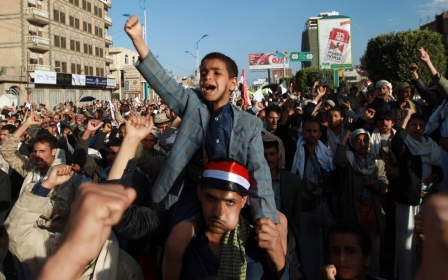Top Houthi journalist shot dead in Sanaa, Yemen

Gunmen on a motorbike shot dead a Yemeni journalist who also acted as a top official for Yemen's Houthi militia in the capital Sanaa on Wednesday, a security source said.
Abdul Karim al-Khaiwani, a member of the Revolutionary Committee of the Houthis who seized control of Sanaa last September, was attacked by two gunmen, the source said.
The Houthis' television channel Al-Massira confirmed the report, saying that Khaiwani had been shot close to his home.
Khaiwani faced imprisonment over his journalism several times under the rule of former strongman President Ali Abdullah Saleh, most recently being sentenced to six years in prison in 2008.
At that time, Khaiwani complained that the authorities were "trying to silence" him.
Amnesty International awarded Khaiwani the Special Award for Human Rights Journalism Under Threat in 2008, days after his imprisonment for strongly criticising government policies in his newspaper al-Shora.
Amnesty released a statement on Wednesday condemning the "despicable" killing, warning that it would stifle future criticism of the government and calling for an impartial investigation into his death.
As well as his journalism, Khaiwani also represented the Houthis' Ansarullah movement during national talks stipulated by a UN-backed peace agreement that ended a year of deadly protests against President Ali Abdullah Saleh, who stepped down in February 2012.
The talks concluded in January last year with a plan to turn the republic into a federation of six regions - a blueprint that the Houthis strongly opposed.
Houthis abduct 9 activists, release 3 policemen
Meanwhile, Houthi militants on Wednesday kidnapped nine activists in capital Sanaa and released three intelligence officers who they had abducted one day earlier, eyewitnesses and a security source have said.
Eyewitnesses told the Anadolu Agency that Houthi militants had abducted nine activists in central Sanaa.
The activists, they said, had been distributing flyers calling for a demonstration later on Wednesday marking four years since 50 protesters were killed during the 2011 uprising.
The nine activists, witnesses added, had been taken to an undisclosed location.
Meanwhile, a security source said the Houthis had released three intelligence officers who they had abducted one day earlier in capital Sanaa.
The source declined to give further details.
The Houthi group has recently abducted a number of political opponents who have participated in recent anti-Houthi demonstrations across the country.
Houthi officials, for their part, could not be reached for comment.
Houthis attack senior army chief's house
Houthi militiamen attacked the house of a senior army commander on Tuesday, killing one guard and detaining two more, an army source said.
General Mohammed Rajah Laboudha was not home at the time.
The source said the Shiite militiamen were "responding to a gun attack on Sunday on the convoy of the Houthi military commander, Abu Ali al-Hakam".
General Laboudha heads the Fifth Military Region, which covers the strategic Red Sea province of Hudeida, which has been partly held by the Houthis since they seized power in Sanaa on 6 February.
The Houthis have been in effective control of Sanaa since September, expanding their zone of control to neighbouring regions and to the shores of the Red Sea.
President Abd Rabbuh Mansour Hadi escaped last month from house arrest in Sanaa and has fled to second city Aden in the south, where he is attempting to re-establish authority.
The Houthis had issued what they described as a constitutional declaration dissolving the elected parliament and establishing a 551-member transitional council.
The declaration, however, was rejected by most of Yemen's political forces – along with some neighbouring Gulf countries – which described it as a "coup against constitutional legitimacy."
Stay informed with MEE's newsletters
Sign up to get the latest alerts, insights and analysis, starting with Turkey Unpacked
Middle East Eye delivers independent and unrivalled coverage and analysis of the Middle East, North Africa and beyond. To learn more about republishing this content and the associated fees, please fill out this form. More about MEE can be found here.




